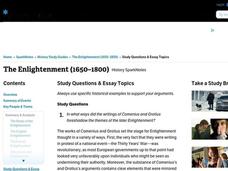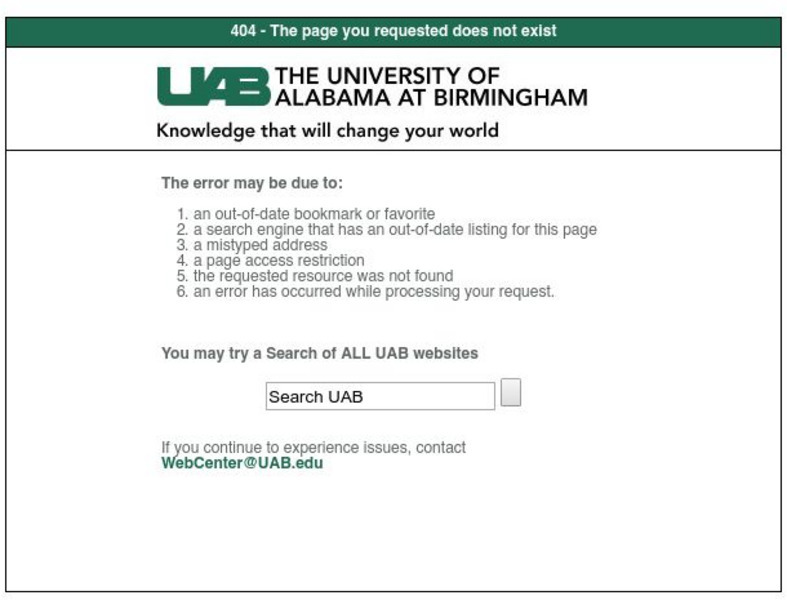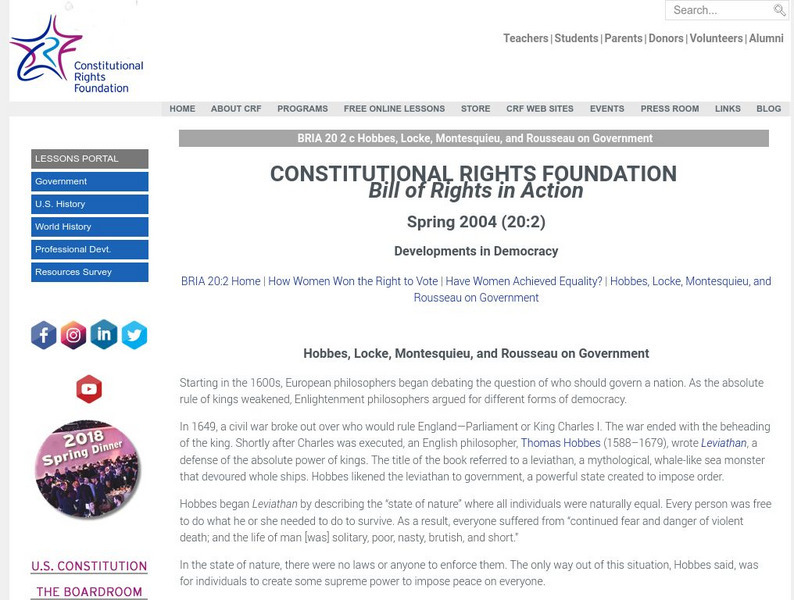iCivics
Why Government?
Why do people create governments? Where did we get our ideas about government? This is a fantastic introductory lesson for your American government class that begins by reviewing the philosophies of Thomas Hobbes and John Locke in...
Curated OER
Why Do Governments Exist? Locke, Hobbes, Montesquieu, and Rousseau
Here is a great secondary source reading that includes the primary ideas and philosophies of the famed Enlightenment philosophers: Thomas Hobbes, John Locke, Charles Montesquieu, and Jean-Jacques Rousseau. In additional to discussing...
Curated OER
Locke v. Hobbes
In this Hobbes and Locke study guide worksheet, students respond to 18 short answer questions. The questions correlate to assigned readings in a textbook.
Curated OER
The Enlightenment in Europe: Ch 22
Why study European Enlightenment? Because our governing forefathers and constitution were shaped by their words and philosophies. Presented here are facts and achievements of 8 different figures from the enlightened era. Also included is...
Curated OER
Quotes by Hobbes, Locke, Montesquieu, Rousseau, and Voltaire
In Enlightenment quotations study guide worksheet, students read quotations and identify the speakers as Hobbes, Locke, Montesquieu, Rousseau, Peter the Great, Copernicus, Louis XIV, Galileo, Harvey, Kepler , Frederick the Great, or...
Curated OER
The Visions of Locke and Hobbes
In this visions of Locke and Hobbes study guide worksheet, students read the notes provided regarding government and add notes of their own.
Curated OER
Unit 12: Enlightenment and French Revolution
In this Enlightenment lesson, students respond to 34 short answer questions about John Locke, Thomas Hobbes, Baron de Montesquieu, Jean Jacques Rousseau, Voltaire, Denis Diderot, and Mary Wollstonecraft.
Curated OER
The Noble Savage - The Social Contract Rights and Freedoms of Modern Humanity
High schoolers, in groups, research various philosophers and the historical context of their work. They discuss the necessity and interaction of laws, regulations and human freedoms and consider the importance of the Canadian government...
Curated OER
The Enlightenment (1650–1800)
For this online interactive history worksheet, learners respond to 9 short answer and essay questions about the Enlightenment. Students may check some of their answers on the interactive worksheet.
iCivics
I Civics: Why Government?
Dig into philosophers Thomas Hobbes and John Locke's ideas and see how they've influenced those that have followed in their footsteps.
Other
University of Alabama: Government
Overview in note form on social and political philosophy comparing Plato, Locke, and Hobbes. Scroll to "natural rights" which the author discusses in context for understanding the political and social philosophies of these political...
Digital History
Digital History: By What Right [Pdf]
Two opposing philosophies concerning the relationship between government and its citizens were expressed by Thomas Hobbes and John Locke in the 17th century. Compare these two philosophies and see how they were related to the colonists'...
iCivics
I Civics: Philosophically Correct
Trace how philosophers throughout history have envisioned the ideal government. Explore ideas from Locke, Hobbes, Rousseau, and more.
Constitutional Rights Foundation
Constitutional Rights Foundation: Developments in Democracy
Learning activity in which students study the ideas of Enlightenment philosophers, Hobbes, Locke, Montesquieu, and Rousseau. Lesson includes individual, group and whole class activity in which students write, discuss and debate the role...













